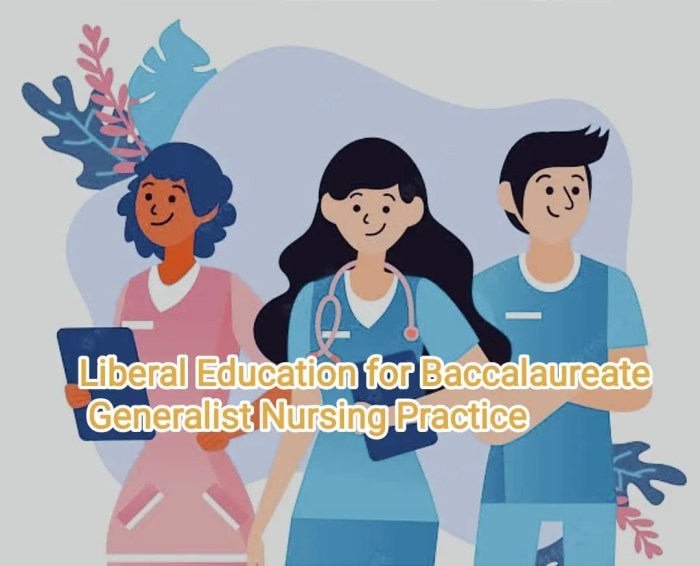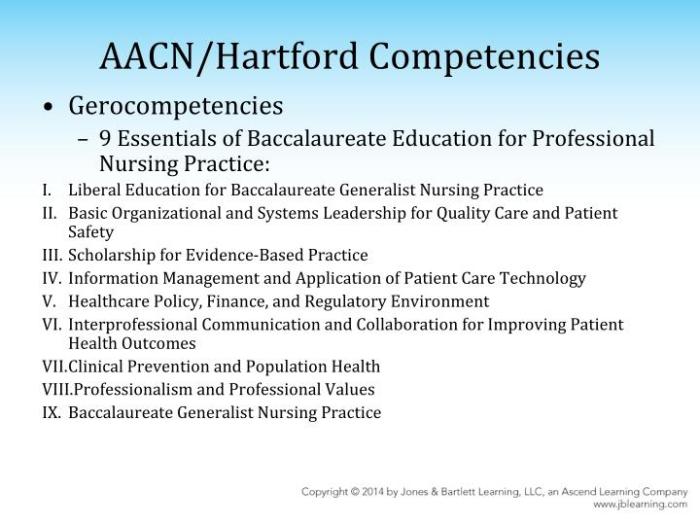Liberal education for baccalaureate generalist nursing practice has emerged as a transformative approach to nursing education, fostering critical thinking, problem-solving, and communication skills essential for providing holistic and patient-centered care.
This multifaceted approach integrates liberal arts disciplines into nursing curricula, equipping nurses with a well-rounded knowledge base and the ability to address the complex challenges of contemporary healthcare.
Definition of Liberal Education
Liberal education is a broad-based approach to education that emphasizes the development of critical thinking, problem-solving, and communication skills. It encompasses the study of the humanities, social sciences, natural sciences, and arts, providing students with a comprehensive understanding of the world and their place within it.
In baccalaureate generalist nursing practice, liberal education plays a vital role in preparing nurses to provide holistic and patient-centered care. It fosters nurses’ ability to understand and respond to the complex needs of patients and their families, as well as to navigate the ethical and social challenges that arise in healthcare settings.
Key Principles and Values of Liberal Education
- Intellectual curiosity and a lifelong commitment to learning
- Critical thinking and problem-solving abilities
- Effective communication and interpersonal skills
- Ethical decision-making and social responsibility
- Cultural competence and global perspectives
Benefits of Liberal Education for Nursing: Liberal Education For Baccalaureate Generalist Nursing Practice
A liberal education provides nurses with a strong foundation for critical thinking, problem-solving, and communication skills. These skills are essential for nurses to effectively assess patients, develop and implement care plans, and communicate with patients, families, and other healthcare professionals.
Moreover, a liberal education enhances nurses’ ability to provide holistic and patient-centered care. By understanding the social, cultural, and psychological factors that influence health, nurses can better tailor their care to the unique needs of each patient.
Examples of Benefits
- Improved critical thinking skills enable nurses to analyze patient data, identify potential problems, and develop appropriate interventions.
- Enhanced problem-solving skills allow nurses to develop creative solutions to complex patient care challenges.
- Effective communication skills facilitate nurses’ ability to build rapport with patients, explain treatment plans, and provide emotional support.
- Cultural competence enables nurses to provide culturally sensitive care that respects the values, beliefs, and practices of diverse patient populations.
Core Components of Liberal Education for Nursing

The core components of a liberal education for baccalaureate generalist nursing practice include:
Humanities
- Literature
- History
- Philosophy
- Art
Social Sciences
- Sociology
- Psychology
- Anthropology
- Political science
Natural Sciences
- Biology
- Chemistry
- Physics
- Anatomy and physiology
Arts
- Music
- Dance
- Drama
- Studio art
Integration of Liberal Education into Nursing Curriculum
Liberal education is integrated into nursing curricula through a variety of courses, assignments, and experiential learning opportunities.
Courses
- Nursing theory and research
- Health policy and ethics
- Cultural competence in nursing
- Interdisciplinary collaboration in healthcare
Assignments
- Research papers on topics related to liberal education
- Case studies that explore the ethical and social implications of nursing practice
- Service-learning projects that provide students with opportunities to apply their liberal education knowledge in real-world settings
Experiential Learning Opportunities
- Clinical rotations in diverse healthcare settings
- Study abroad programs that expose students to different cultures and healthcare systems
- Internships in research or policy-making organizations
Challenges and Opportunities
- Integrating liberal education into nursing curricula can be challenging due to the already demanding nature of nursing education.
- However, it is essential to ensure that nurses have the knowledge and skills necessary to provide holistic and patient-centered care.
- Opportunities exist to integrate liberal education into nursing curricula through innovative teaching methods and interdisciplinary collaborations.
Assessment of Liberal Education Outcomes in Nursing
The outcomes of liberal education in nursing practice can be assessed through a variety of methods, including:
Direct Observation, Liberal education for baccalaureate generalist nursing practice
- Observation of nurses’ critical thinking, problem-solving, and communication skills in clinical settings
Portfolio Assessment
- Collection of student work, such as research papers, case studies, and service-learning projects, that demonstrate liberal education outcomes
Standardized Tests
- Administration of standardized tests, such as the National Council Licensure Examination for Registered Nurses (NCLEX-RN), to assess nurses’ knowledge and skills
Self-Assessment
- Use of self-assessment tools to encourage nurses to reflect on their own learning and identify areas for improvement
Future Directions in Liberal Education for Nursing

Emerging trends and future directions in liberal education for nursing practice include:
Technology
- Use of technology to enhance teaching and learning of liberal education content
- Development of online and blended learning programs that make liberal education more accessible to nurses
Interdisciplinary Collaboration
- Collaboration with other disciplines, such as medicine, social work, and public health, to develop innovative approaches to liberal education for nurses
Global Perspectives
- Incorporation of global perspectives into liberal education for nurses to prepare them for practice in a globalized healthcare environment
Essential Questionnaire
What are the key principles of liberal education in nursing?
Liberal education in nursing emphasizes critical thinking, problem-solving, communication, cultural sensitivity, and ethical decision-making.
How does liberal education enhance nurses’ patient care abilities?
Liberal education equips nurses with a broader perspective, enabling them to understand patients’ social, cultural, and psychological needs and provide holistic care.
What are the core components of liberal education for baccalaureate generalist nursing practice?
Core components include humanities, social sciences, natural sciences, and mathematics, which provide a foundation for understanding human health and behavior.
